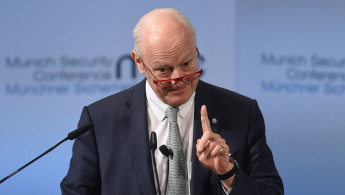Pessimism reigns ahead of Syria Geneva talks
"I can't tell you [if it will succeed], but we have to push with the momentum. Even a cease-fire cannot hold too long if there is no political [solution]," said UN Special envoy for Syria Staffan de Mistura.
A fragile cease-fire was brokered by Russia and Turkey during previous talks in the Kazakh capital, Astana.
"One thing I'm missing at the moment... is a clear US strategy," added the veteran diplomat. "Where are the United States [on a political solution]? I can't tell you, because I don't know."
De Mistura's previous mediations in conflicts - in Iraq and Afghanistan - were simpler than in Syria, due to Washington's lack of a clear position towards ending the six-year civil war, he said.
During his election campaign, US President Donald Trump suggested his administration would pursue closer ties with Russia to combat the Islamic State group.
 |
One thing I'm missing at the moment... is a clear US strategy Staffan de Mistura, UN Special Envoy for Syria |
 |
Trump has also called for the establishment of safe-zones inside Syria to prevent migration from the region into Europe.
However, since taking office no clear policy has emerged.
The United States, in addition to Gulf states and Turkey, have backed rebel forces fighting against Syrian President Bashar al-Assad. Opponents to Assad's regime took up arms following a brutal crackdown on dissent and peaceful protests that emerged in 2011.
However, Washington's position has been complicated by alliances created between rebel groups and hardline Islamist factions - including IS, and in particular the al-Qaeda-linked Jabhat Fateh al-Sham - in the fight against Assad.
Talks in Geneva between the Syrian regime and opposition figures are set to resume on Thursday, nine months after previous talks in the Swiss city collapsed.
De Mistura said that the Geneva talks would focus on developing a new constitution, plans for free and fair elections - to be overseen by the UN, and transparent and accountable governance.
However, the UN envoy aroused some concern in opposition circles after the term "political transition" was removed from descriptions of the goal of the talks.
Opposition figures interpreted the phrase's removal as evidence that the UN was moving away from a position demanding Assad must step down from power, with Syrian National Coalition President Anas al-Abdah stating "profound security threats" could not be addressed "while Assad remains in power".
US envoy Brett McGurk - an Obama appointee retained by the Trump administration, tasked with helping coordinate the war against IS - has said that Washington was conducting a full review of its Syria policy.
However, he - like de Mistura - has cautioned against setting high expectations for a quick solution to a complex, multi-faceted conflict with violence ongoing on many fronts within Syria.
(Agencies contributed to this report)





 Follow the Middle East's top stories in English at The New Arab on Google News
Follow the Middle East's top stories in English at The New Arab on Google News


